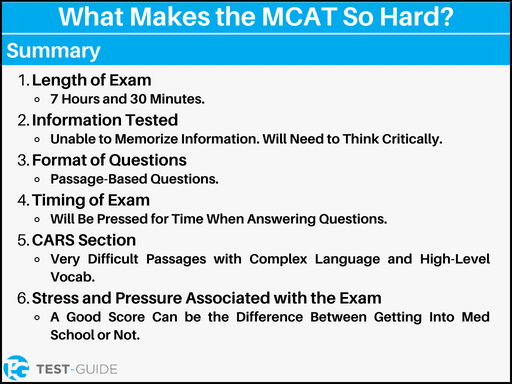Have you ever wondered how hard is the MCAT?
The short answer to this question is yes, the MCAT is hard. We will discuss the difficulty of this exam along with why it is so challenging.
Is the MCAT Hard?
Yes, the MCAT is a very challenging exam. The exam covers numerous topics and goes into great detail on each of those topics.
The exam is extremely long and lasts for 7 hours and 30 minutes. You will be asked to answer 230 questions. The questions on the MCAT will require you to use your critical thinking skills and connect multiple concepts to answer questions.
In addition, the MCAT is a high-stakes exam which makes it even more challenging. For many individuals, a high score on the MCAT is the difference between attending medical school or not.
To make the exam a little easier, take our free MCAT practice test to start preparing.
What Makes the MCAT So Hard?
There is not one specific thing that makes the MCAT exam so hard. There are a combination of things that make the exam so challenging.

1. Length of Exam
The MCAT lasts for a total of 7 hours and 30 minutes. The actual time spent taking the test (answering questions) is 6 hours and 15 minutes.
7 hours and 30 minutes is an extremely long time to be taking an exam. This is a major challenge for a lot of individuals. The MCAT is one of the longest standardized exams out there. Here is a comparison to other exams:
| Exam | Length |
|---|---|
| MCAT | 7 Hours 30 Minutes |
| SAT (Digital SAT) | 2 Hours 14 Minutes |
| ACT | 2 Hours 55 Minutes |
| LSAT | 3 Hours |
| DAT | 4 Hours 30 Minutes |
| GRE | 3 Hours 45 Minutes |
| GMAT | 3 Hours 30 Minutes |
When comparing the MCAT to other standardized exams, it is almost twice as long as all other exams.
2. Information Tested
Unfortunately, you will not be able to memorize information for this exam. The MCAT will test you across multiple different topics and subjects.
The most challenging aspect of the information tested is that you will need to think critically about each question and apply knowledge across multiple topics and subjects to answer a single question.
Some of the disciplines you will be tested on include:
- Biochemistry
- Biology
- General Chemistry
- Organic Chemistry
- Physics
- Reading Comprehension
- Psychology
- Sociology
3. Format of Questions
Each section of the exam contains mostly passage-based questions and then some standalone questions (except the CARS section, which contains all passage-based questions). Learn more about MCAT sections.
These passage-based questions will require you to read a passage and answer questions based on the passage. You will need to apply outside knowledge paired with the information given in the passage to answer the questions.
The only exception is the CARS section, which will not require any outside knowledge. The answers will be within the passage.
The best way to prepare for this challenging aspect of the MCAT is by taking a MCAT practice test beforehand to become more familiar with the questions.
4. Timing of the Exam
With the MCAT being so long, you may think that you have plenty of time to answer the questions on the exam. This is not the case.
The timing of the exam is very tight. It gets especially tight when you factor in the need to read passages and think critically. The table below breaks down how much time you can expect to spend on each question within each section.
| Section | Total Time Limit (Minutes) | Questions | Time Limit / Question |
|---|---|---|---|
| Chemical and Physical Foundations of Biological Systems | 95 | 59 | 96 Seconds |
| Critical Analysis and Reasoning Skills (CARS) | 90 | 53 | 101 Seconds |
| Biological and Biochemical Foundations of Living Systems | 95 | 59 | 96 Seconds |
| Psychological, Social, and Biological Foundations of Behavior | 95 | 59 | 96 Seconds |
We recommend taking a MCAT practice exam and seeing where you stand when it comes to timing. It may take a couple of tries to get your timing down and find what works best for you.
5. CARS Section
This section of the exam is very unique when compared to the other sections on the exam. The CARS section consists entirely of reading passages (9). Each passage is between 500 and 600 words and has 5-7 questions.
You will not be required to have any outside knowledge to answer the questions. All the answers will be in the passages. What makes this section so difficult is the style of the passages.
The passages will include complex language, high-level vocabulary, and have a unique writing style. Individuals who have not practiced for this section will really struggle.
6. Stress and Pressure Associated with the Exam
There is no way around it, the MCAT is a high-stakes exam with a ton of stress and pressure associated with it. For many individuals, a good score on this exam is the difference between getting into medical school and not getting into medical school.
Testing anxiety is a real thing. Some individuals put so much pressure on themselves when preparing for and taking this exam that they end up not doing well.
We recommend giving yourself plenty of time to study. Find a MCAT test date that allows you to study and prepare adequately before your test day. The more prepared you are, the less stress and pressure you will be putting on yourself.
How Hard is it to Pass the MCAT?
There is not technically a passing score for the MCAT. However, there are certain scores that you will want to aim for that will give you a better chance of getting into medical school.
Listed below are scores and the percentage of individuals admitted into medical school with that score.
- Less Than 486: 7%
- 486-489: 3%
- 490-493: 6%
- 494-497: 6%
- 498-501: 9%
- 502-505: 9%
- 506-509: 7%
- 510-513: 1%
- 514-517: 68%
- Greater than 517: 1%
You can learn more about good MCAT scores with our complete guide.
Frequently Asked Questions
Is the MCAT a difficult exam?
The MCAT is one of the longest standardized tests you can take, and it tests multiple areas of knowledge as well as your problem-solving and critical-thinking skills.
The test will be challenging but proper studying and preparation can make it manageable. If you go into the exam unprepared, you will struggle.
What are some ways to make the MCAT easier?
Some ways to make the exam easier include:
- Take full length practice exams
- Invest in a prep course
- Narrow down your problem areas and focus on those specific areas
- Give yourself plenty of time to study (no cramming)
Is the MCAT harder than other standardized exams?
The MCAT is widely regarded as being harder than other standardized exams. The MCAT is longer (7 hours and 30 minutes) than most other exams. The MCAT also includes very tricky questions that require both knowledge of the concept and critical thinking skills to solve.

